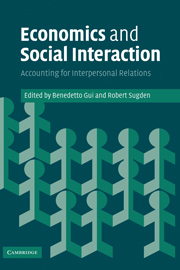Book contents
- Frontmatter
- Contents
- List of illustrations
- Notes on contributors
- Preface
- 1 Why interpersonal relations matter for economics
- 2 From transactions to encounters: the joint generation of relational goods and conventional values
- 3 Fellow-feeling
- 4 Interpersonal interaction and economic theory: the case of public goods
- 5 Under trusting eyes: the responsive nature of trust
- 6 Interpersonal relations and job satisfaction: some empirical results in social and community care services
- 7 On the possible conflict between economic growth and social development
- 8 The logic of good social relations
- 9 The mutual validation of ends
- 10 Hic sunt leones: interpersonal relations as unexplored territory in the tradition of economics
- 11 Authority and power in economic and sociological approaches to interpersonal relations: from interactions to embeddedness
- 12 Interpersonal relations and economics: comments from a feminist perspective
- 13 Economics and interpersonal relations: ruling the social back in
- Envoi
- References
- Index
3 - Fellow-feeling
Published online by Cambridge University Press: 15 December 2009
- Frontmatter
- Contents
- List of illustrations
- Notes on contributors
- Preface
- 1 Why interpersonal relations matter for economics
- 2 From transactions to encounters: the joint generation of relational goods and conventional values
- 3 Fellow-feeling
- 4 Interpersonal interaction and economic theory: the case of public goods
- 5 Under trusting eyes: the responsive nature of trust
- 6 Interpersonal relations and job satisfaction: some empirical results in social and community care services
- 7 On the possible conflict between economic growth and social development
- 8 The logic of good social relations
- 9 The mutual validation of ends
- 10 Hic sunt leones: interpersonal relations as unexplored territory in the tradition of economics
- 11 Authority and power in economic and sociological approaches to interpersonal relations: from interactions to embeddedness
- 12 Interpersonal relations and economics: comments from a feminist perspective
- 13 Economics and interpersonal relations: ruling the social back in
- Envoi
- References
- Index
Summary
Introduction
Vilfredo Pareto was one of the first economists to use indifference curves as an analytical tool. Explaining their usefulness, he described a person's indifference map as a ‘photograph’ of his tastes. ‘Provided he has left us this photograph, the individual may disappear’ (1909, ch. 3, sect. 57). In other words: once we know a person's indifference map, we have everything we need to analyse his economic behaviour. The idea that, for the purposes of economics, a human being is just an indifference map has become something of a folk saying among economists. The point of this saying is that economic theory models human beings as abstract rational agents; their identities as particular people are represented only in the preferences that they have as individuals. This approach commits economics to a modelling strategy in which relations between people are impersonal and instrumental.
Over the last twenty years, however, it has become increasingly common for economists to consider the possibility that economic behaviour is not always instrumental in its motivation. (Of course, economics has never been committed to the position that all relations between people are instrumental. Economists have been able to claim that there are areas of human life, such as the family, in which relations are non-instrumental – and then to say that these areas lie outside the domain of economic explanation.)
- Type
- Chapter
- Information
- Economics and Social InteractionAccounting for Interpersonal Relations, pp. 52 - 75Publisher: Cambridge University PressPrint publication year: 2005
- 11
- Cited by



